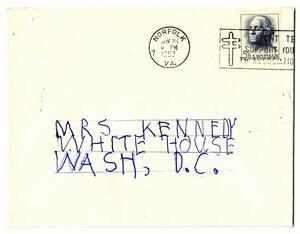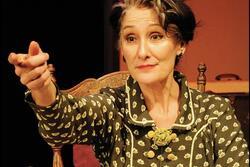Letters to Jackie
If you’ve watched CNN, CBS “Sunday Morning,” or the PBS “NewsHour” in the past month, you have probably seen grainy, black-and-white clips of President Kennedy’s funeral. The historic footage has accompanied reports on Ellen Fitzpatrick’s powerful new book, Letters to Jackie: Condolences from a Grieving Nation. A collection of about 250 letters from the archives at the John F. Kennedy Library and Museum in Boston, Letters to Jackie gives people like the man who wrote “I myself am just a nobody from nowhere” their rightful place in American history.
The President’s widow received over 1.5 million condolence letters, 800,000 of them within seven weeks of the assassination. The amount of correspondence was so overwhelming that the National Archives was forced to destroy the vast majority of the letters, but nearly 10,000 are preserved at the Kennedy Library. Jacqueline Kennedy recognized that the letters were not only for her and her children but were also a legacy for the American people. Indeed, as Fitzpatrick shows in the letters she selected and in the essays that introduce each group of letters, this long overlooked collection lets us hear amazingly diverse and only rarely heard voices from the 1960s—Appalachian coal miners, prison inmates, fraternity brothers, school children, suburban housewives, college students, Army privates, elderly widows, and, remarkably, Holocaust survivors.
One of the survivors who wrote to Mrs. Kennedy was a Jewish woman, who endured the Nazi occupation of Poland. “I am one of those persons who lost my entire family in a very cruel way during world war two, in Europe,” Jean Schechter wrote in April of 1964. “I thought that nothing in this world could hurt me any more, but how mistaken I was.”
Another Jewish woman described the service held at her synagogue on the day the President was killed. “In the Jewish religion,” she explained, “when a father dies, the son must stand and say ‘Kaddish’—a most meaningful prayer and only permitted by the sons. In our synagogue, our Rabbi told us that we had all just lost our father, and the entire congregation stood up to say Kaddish. At the conclusion of the service, the Rabbi and Cantor marched down the aisle Chanting prayers as if following the casket.”
Like the Holocaust survivor whose “heart still cries out for our beloved President,” the lifelong Republican who was “deeply ashamed at the manner in which the President met his end,” the seven-year-old boy who wrote simply “I AM SORRY HE IS DEAD,” the African-Americans who told Mrs. Kennedy they would “always remember your husband as Our President, from the smallest baby to the oldest grandmother,” millions of Americans experienced the assassination of President Kennedy as a devastating personal loss. Some of us remember that loss as clearly as if it were yesterday.
Ellen K. Rothman is Deputy Director of the Jewish Women’s Archive.
Photo reprinted by permission from Letters to Jackie, copyright © 2010 by Ellen Fitzpatrick.






